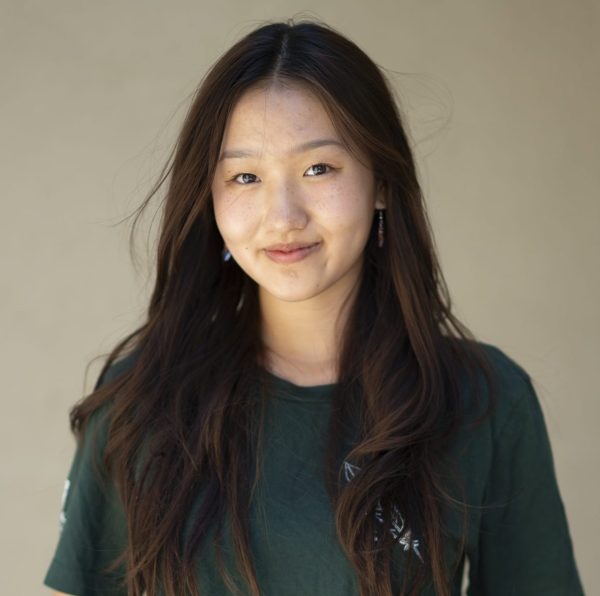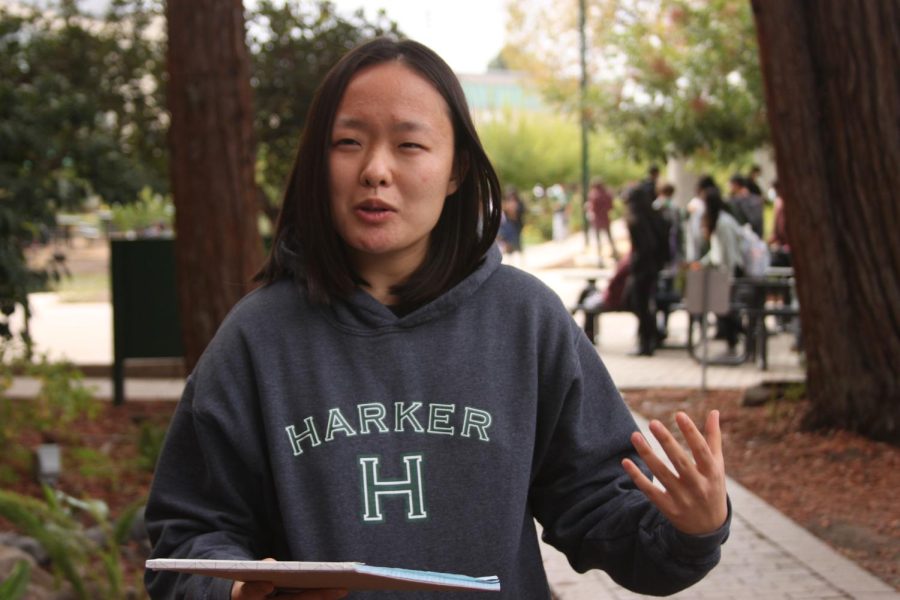Humans of Harker: To teach with trust
April Sun branches out within the world of education
“Whether it be debate, DECA, or teaching, I have to make sure that, yes, I have these ideas, but how do I give these ideas out? Everyone I’ve met has brilliant ideas, but it’s about how you express those ideas so that people will think it’s cool, and that’s something I’m still trying to learn,” April Sun (12) said.
Standing in her mellow, mint-green room, clad in a loose, navy T-shirt, with the glare of a fluorescent light behind her, she begins her speech with the quiet confidence of a seasoned speaker, even in the unusual setting. Her words flow together seamlessly as her voice modulates. Enunciating each sentence with clarity, she speaks with urgency about how small businesses are struggling to stay afloat during the ongoing COVID-19 lockdown. She places her hand over her heart, seemingly indicating her empathy through the computer screen of the recorded practice speech. When she reaches the pinnacle of her argument, her hands fly up in a choreography of synchronized gestures to emphasize her final point.
April Sun (12) first recorded this preliminary speech during remote learning. Through the course of her debate career, her speeches gradually gained more complexity and thoughtfulness as she grew up: a sight her younger self would not have imagined.
She started debate during middle school to develop the techniques of a public speaker, a skill she deemed worthy of trying. A reserved person in middle school, April sought an opportunity to participate with her friends, but later on, she realized that in order to be a confident business person and to assert herself in a room, she had to push herself into unnerving situations.
During her freshman year of high school, April faced yet another hurdle in speech. After continually falling short of her own expectations at competitions, doubt crept up on her, which furthered her negative mindset about her abilities.
“Going to tournaments made me not want to compete because I was stuck for awhile about my worth to the team and Congress as an event,” April said. “I struggled with [accepting] that I wasn’t doing well competitively. Over time, I figured it out by thinking about my failures a bit differently, not as a pounding to my ego but [instead] finding small things I was improving on.”
Yet with the encouragement of her team, April rebounded after a tournament in freshman year when she was disqualified after the first round. In retrospect, the reassurance from the upperclassmen helped her form stronger connections with teammates, and the memories she associates with them remain important to her now because they feature the people she cares about.
Congressional debate and speech teacher Scott Odekirk commends April for her leadership and investment in promoting women’s rights. After hearing a speech about an analogy between the nature of oppression and its growth from a small seed to a tree, Odekirk recognized the scope of April’s ambition in that metaphor in the speech and how the complexity of it was related to her political perspective of the fundamentals of oppression and its relation to women, race and class.
“She [is] deeply insightful for her age [and] has empathy,” Odekirk said. “When we talked about issues, she always had [an] uncommon awareness for the struggles of other people and a deep care for them as human beings. What’s changed in her is a real willingness and confidence to call people out to express her own opinion, rather than just validate other’s opinions.”
Fellow DECA member Tina Zhong (12) noticed April’s change since her seventh grade self after going to DECA conferences with her during freshman and sophomore years.
“She works very hard, and she would practice the presentation in the room over and over in the room at night,” Tina said. “She’s pretty confident about speaking now. She’s willing to just do it and go for it.”
Other than partaking in competitions with her friends, April also enjoys the small moments: whether it be hiking up a small trail or ice skating with Tina or bringing grapes for her friends, she derives happiness from expressing her appreciation for them.
Close friend Lucy Ge (12) recalls participating as a San Jose community chapter of Real Talk Ed co-president with her. A club aiming to engage youths in civil discourse, Real Talk helped highlight April’s background in public speaking, her debater perspective and her self-assurance.
“That’s something I really admire about [April], her strong sense of self,” Lucy said. “The kind of confidence I see in her is rare and never influenced by others’ perspectives. She gave a speech once about education advocacy, and the way she presented herself to a huge crowd of people was inspiring. It gives her a unique perspective because it allows her to bring her true self to the table.”
Education remains as a connection between April and her previous mentors. An upperclassman on the debate team introduced April to mentorship in sophomore year, and since then, she has moved to teaching speech and debate and computer science at a local school.
“One of the most rewarding moments of teaching is when students really trust you,” April said. “[It’s] a deeper sort of trust where they share parts of their lives with you. Those moments are worth [it]. It’s nice to know that they can have a trustworthy figure in their life who just happens to be me.”
By devoting herself to her students by bringing her scope of knowledge to them, April finds students with less experience and opportunities to help so that they have a chance at succeeding just as her mentors did for her. But as with all the wonders of education, self-doubt and internal conflict that went along with teaching also pushed April to learn more about communication, the key to mentorship.
“Something I struggled with was forming and shaping ideas [in a way] that other people could understand and make sense of,” April said. “Whether it be debate, DECA, or teaching, I have to make sure that, yes, I have these ideas, but how do I give these ideas out? Everyone I’ve met has brilliant ideas, but it’s about how you express those ideas so that people will think it’s cool, and that’s something I’m still trying to learn.”

Katelyn Zhao (12) is the co-editor-in-chief of Humans of Harker, and this is her fourth year on staff. Katelyn aims to honor each of the stories within...


















![“[Building nerf blasters] became this outlet of creativity for me that hasn't been matched by anything else. The process [of] making a build complete to your desire is such a painstakingly difficult process, but I've had to learn from [the skills needed from] soldering to proper painting. There's so many different options for everything, if you think about it, it exists. The best part is [that] if it doesn't exist, you can build it yourself," Ishaan Parate said.](https://harkeraquila.com/wp-content/uploads/2022/08/DSC_8149-900x604.jpg)




![“When I came into high school, I was ready to be a follower. But DECA was a game changer for me. It helped me overcome my fear of public speaking, and it's played such a major role in who I've become today. To be able to successfully lead a chapter of 150 students, an officer team and be one of the upperclassmen I once really admired is something I'm [really] proud of,” Anvitha Tummala ('21) said.](https://harkeraquila.com/wp-content/uploads/2021/07/Screen-Shot-2021-07-25-at-9.50.05-AM-900x594.png)







![“I think getting up in the morning and having a sense of purpose [is exciting]. I think without a certain amount of drive, life is kind of obsolete and mundane, and I think having that every single day is what makes each day unique and kind of makes life exciting,” Neymika Jain (12) said.](https://harkeraquila.com/wp-content/uploads/2017/06/Screen-Shot-2017-06-03-at-4.54.16-PM.png)








![“My slogan is ‘slow feet, don’t eat, and I’m hungry.’ You need to run fast to get where you are–you aren't going to get those championships if you aren't fast,” Angel Cervantes (12) said. “I want to do well in school on my tests and in track and win championships for my team. I live by that, [and] I can do that anywhere: in the classroom or on the field.”](https://harkeraquila.com/wp-content/uploads/2018/06/DSC5146-900x601.jpg)
![“[Volleyball has] taught me how to fall correctly, and another thing it taught is that you don’t have to be the best at something to be good at it. If you just hit the ball in a smart way, then it still scores points and you’re good at it. You could be a background player and still make a much bigger impact on the team than you would think,” Anya Gert (’20) said.](https://harkeraquila.com/wp-content/uploads/2020/06/AnnaGert_JinTuan_HoHPhotoEdited-600x900.jpeg)

![“I'm not nearly there yet, but [my confidence has] definitely been getting better since I was pretty shy and timid coming into Harker my freshman year. I know that there's a lot of people that are really confident in what they do, and I really admire them. Everyone's so driven and that has really pushed me to kind of try to find my own place in high school and be more confident,” Alyssa Huang (’20) said.](https://harkeraquila.com/wp-content/uploads/2020/06/AlyssaHuang_EmilyChen_HoHPhoto-900x749.jpeg)



